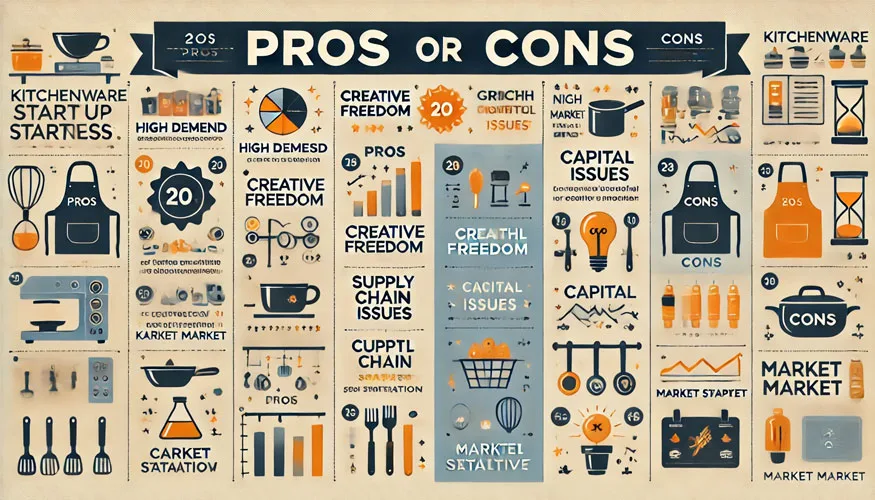Starting a kitchenware startup business can both be exciting and intimidating. With many consumers getting into the trend of home cooking and culinary innovation, a kitchenware business may seem like a good idea. Yet, it is essential to weigh the benefits and drawbacks before starting. Having an informed decision will help you decide whether this business is the right fit for you. Here we are going to explore 20 key pros and cons of starting a kitchenware startup business.

Pros
Rising Consumer Interest
The kitchenware market has seen a significant rise in consumer interest over the last few years and is projected to even increase in the next 5 years to come. More people are interested in investing in home cooking supplies which results in a higher demand for high-quality and reliable kitchenware. This growing interest makes a good reason for businesses to enter the kitchenware supply industry.
Opportunity for Creative Freedom
Launching a kitchenware startup allows you to apply your creative and artistic sides. You can incorporate your vision in designing and developing your own kitchenware line, as well as creating unique kitchen solutions based on your own experience. This gives your products a better opportunity to stand out in the market and build a memorable identity for your brand.
Diverse Product Range
A kitchenware line can go from the most basic utensils to more advanced gadgets. Understanding your niche and knowing the preferences of your target market allows you to explore which items would be more in demand. The diversity of the product range offers a better opportunity to target an even bigger market and the potential to expand to other kitchen or cooking-related lines.
High Potential Profit Margins
One of the advantages of a kitchenware business is a strong profit potential which can be achieved through effective pricing strategies and significant markups. By focusing on high-quality kitchenware, you can leverage these profit margins to build a financially successful business.
Online Selling Opportunities
The advent of e-commerce and digital marketing platforms plays to the advantage of any business framework. You can utilize e-commerce to reach a global audience even without having a physical store. It allows you to reduce the expenses of running the business while reaching more customers, therefore enhancing your business’s growth potential.

Flexible Work Environment
Another key advantage of launching a kitchenware startup is that it allows you to set up a flexible work environment. You have the option to operate your business from home or a small office. You can even adjust your work hours and manage your team remotely to better suit your lifestyle. This setup allows for a more personalized business approach.
Scalability
When starting a kitchenware startup business, you can start offering basic utensils first to establish your business, then later on expand to more advanced kitchen gadgets. As your business grows, you can expand your product lines, increase production, and enter new markets. This ability to scale allows you to adjust your operations to meet growing market demand, thereby ensuring sustained growth and success in the future.
Brand Loyalty and Repeat Customers
One of the perks of having a kitchenware business is that it has excellent potential for brand loyalty and repeat customers. When you offer good customer service, and aftersales care, and earn a reputation for offering high-quality products, it leads to building a loyal customer base who may also recommend your brand to others. Satisfied clients always come back to buy again thus helping the business grow stably.
Innovation and Trends
Kitchenware is one of the most dynamic industries that face evolving trends and continuous innovation. Having a kitchenware business allows you to use the latest technologies and design trends to keep up with the evolving market. By staying ahead of the curve, you can introduce cutting-edge products that meet current consumer demands and establish your brand as a leader in the market.
Positive Industry Outlook
Based on current market trend reports, the kitchenware industry’s future looks promising. The consumer’s increasing interest in cooking and home dining plays a vital role in the industry’s growth. This provides a stable foundation for kitchenware startup businesses and the opportunity to expand as the market continues to thrive.
Cons
High Competition
As someone who is just about to start a kitchenware business, you may get intimidated by the numerous established brands and new entrants like you who are also aiming to stand out in the market. The challenge to make your brand known to the market, despite being a newcomer, requires innovative marketing strategies, consistent quality, and continuous efforts to differentiate your products from established competitors.
Initial Investment Costs
A kitchenware startup business requires a significant start-up cost. You have to take into consideration different factors such as product development, sourcing and manufacturing, promotional activities, and obtaining the necessary permits, licenses, and insurance. For new entrepreneurs with limited resources, these costs can be overwhelming, hence it is important to prepare well in advance and allocate your budget accurately.
Challenges in Sourcing Materials
Sourcing quality materials for your kitchenware products is yet another challenge for anyone planning to start a kitchenware business. Finding the right suppliers and fluctuating material costs, if not done properly, may result in production delays and increased costs. These factors could impact your ability to deliver products on time and maintain profitability.

Marketing and Branding Costs
Branding, advertising, social media campaigns, and promotional activities should also be considered when planning and organizing your initial investment cost. These costs can add up quickly, and continuous investment is required to maintain visibility and attract customers.
Difficulties in Customer Acquisition
What’s good about a kitchenware business is its ability to build a strong market base. However, this becomes a challenge for newcomers. Reaching your target market and convincing them to try your product requires significant effort and resources. This is where marketing strategies and promotion activities come in, and they can strain your budget and affect your overall profitability if not executed properly.
Risk of Product Failure
Everything in the business world comes with a risk. As for kitchenware products, there is always a risk that your products may not be well-received by the market. Low product sales could be a result of poor product design or ineffective marketing. Investing in products that fail to gain attraction can result in financial losses. In order to avoid these, extensive planning is required. A comprehensive business plan can help mitigate risks, streamline operations, and provide a clear path for growth and success.

Regulatory Compliance
Dealing with regulatory compliance can be a pain for anyone who is starting a kitchenware startup. You have to research the permits and licenses required by your locality as they may differ with other places or states. You have to adhere to a variety of safety standards, certifications, and regulations. For startup companies, this can mean additional expenses and time-consuming processes that could affect the overall operational efficiency.
Inventory Management
In order to avoid any excess or shortage of stocks, it is very important to come up with an effective inventory practice. Managing inventory involves tracking products, forecasting demand, and handling storage, which can be complicated and require careful planning and resources.
Fluctuations in the Economy
Despite the growing market demand, fluctuations in the economy may still impact a customer’s purchasing power. Whenever this happens, customers may prioritize spending on basic commodities rather than invest in other kitchenware. Your business must be prepared to adapt to changing economic conditions to mitigate potential negative effects on your financial performance.
Time-Consuming
Starting and running a kitchenware business is time-consuming. There are several aspects to consider such as product development, managing operations, and customer service. For someone who is just starting, it can be very exhausting trying to balance these tasks and may require long hours and extensive effort to ensure the business’s success.
Starting a kitchenware business has lots of exciting opportunities, however, it also comes with its own fair share of challenges. While it allows you to tap into a growing market, unleash your creativity, and earn huge profits, you must also be prepared to navigate fierce competition, high investment costs, and the complexities of inventory and compliance. Evaluating all pros and cons, and planning effectively, you can turn potential obstacles into stepping stones toward a successful and rewarding kitchenware venture. As a business owner, you should embrace the journey with a strategic mindset, and your culinary business could cook up a recipe for long-term success!